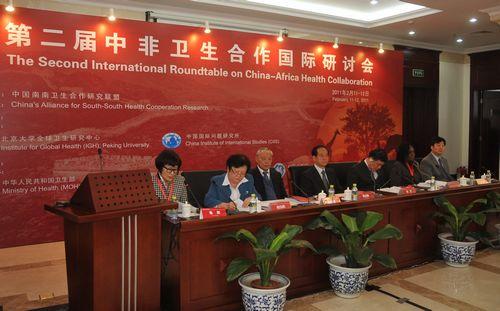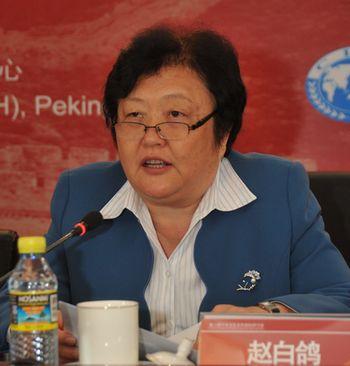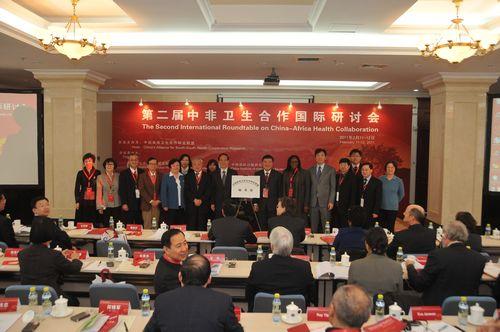
Scene of the meeting
Vice Minister Zhao Baige made a speech

Group photo taken to mark the occasion
On the 11th and 12th of February 2011, the Second International Roundtable on China-Africa Health Collaboration, hosted by China s Alliance for South-South Health Cooperation Research, took place in Beijing. Dr. Zhao Baige, Vice Minister of National Population and Family Planning Commission of China (NPFPC) attended the meeting and made a speech at the opening ceremony.
In her speech, Vice Minister Zhao Baige expounded the significance of China-Africa Health Collaboration from the angle of population. She pointed out that the population of China and Africa accounted for one third of the total 7 billion population of the world; of the newly added population of 80 million persons every year, that of China and Africa accounted for about 40%; currently the total fertility rate (TFR) of Africa was over 4.
45 and one fourth of the family planning needs were unmet; the contraceptive prevalence rate of Sub-Sahara was only 22%, the lowest in the world; and it was also a region with the highest child mortality rate in the world with about one seventh of the children died before five years old there. The above groups of data fully illustrated that it was of great significance to continuously improve the health level of the Chinese and African population for the realization of Millennium Development Goals (MDGs) and the development of the entire mankind.
Vice Minister Zhao Baige emphasized the close interrelationship between population, family planning and health. She said family planning and reproductive health services played an important role in alleviating poverty, promoting socioeconomic development, improving maternal health care and reducing HIV/AIDS spread. She also introduced NPFPC s experiences and practices of China-Africa collaboration in integrating family planning and reproductive health services with HIV/AIDS prevention during recent years.
Vice Minister Zhao Baige said in her speech that capacity building was the key issue for south-south cooperation and also the basic and priority issue for development. It contained construction of human resources and technical support at various aspects such as strategy, management and technology. She suggested that China-Africa health collaboration would demand a batch of new-generation professional forces which should be trained through practice and possessed local knowledge and global thinking, and an organizational and administrative system established and perfected on such basis.
Mr. Han Qide, Vice Chairman of the Standing Committee of the National People s Congress attended the opening ceremony and announced the establishment of China s Alliance for South-South Health Cooperation Research. Dr. Margaret Chan, Director General of World Health Organization (WHO) sent a video address to the meeting. Health Minister Chen Zhu and Vice Minister of Foreign Affairs Zhai Jun also attended the meeting and made speeches. More than 100 participants attended the meeting, including senior officials in charge of health affairs from related Chinese ministries (commissions) and African governments, and representatives from UN agencies, international organizations, NGOs, academic institutions and enterprises. There were energetic and productive discussions during the two-day meeting, around such topics as opportunities and challenges for China-Africa health collaboration, MDGs, partnership of governments and enterprises in south-south cooperation, and channels and measures for multilateral health collaboration.
Related News
- Report on Early Childhood Development and Education in China: Break Poverty Generational Transmission and Improve Future Competitive Capability Was Disseminated
- Statistical Communiqu of the People's Republic of China on the 2010 National Economic and Social Development
- China's 'Floating Population' Exceeds 221 Million
- Vice Minister Zhao Baige Met with OFAP President Nuno Maria Reque Jorge





